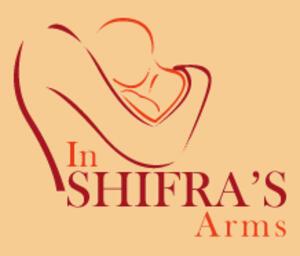Crisis pregnancy center targets Jewish women
Courtesy of In Shifra's Arms.
Last week, Washington Jewish Week reported on the creation of In Shifra's Arms, a new crisis pregnancy center (CPC) targeting Jewish women.
As a Jewish woman and an activist fighting back against the onslaught of CPCs, I was deeply troubled by this news. The Feminist Majority Foundation estimates that there are 3500 CPCs around the country. They appear really great upon first glance. You have probably seen their advertisements in the newspaper or on buses: "Pregnant? Need help?" or "Free pregnancy tests!" The literature and websites of CPCs are covered with the language of choice. Many even use the words "options" or "choices" in their name. In Shifra's Arms' website is full of that kind of language. But that is where the similarities to comprehensive women's health clinics, including Planned Parenthood and independent abortion clinics, end.
CPCs may claim to offer medical or psychological services, but they rarely have medical personnel on staff. They target low-income women and students, often opening across the street from colleges and advertising heavily on campus. In Shifra's Arms is reaching out to students aggressively, according to Washington Jewish Week. The organization placed placards in women's bathrooms and the Hillel building at the University of Maryland - College Park (UMD student government recently passed a bill requiring CPC advertisements on campus to include a disclaimer) and the founder of In Shifra's Arms, Erica Perlman, has visited classes at Charles E. Smith Jewish Day School in Rockville, MD.
CPCs talk about options, but support one choice: carry one's pregnancy to term. They downplay the responsibilities and difficulties of parenting and adoption, and give flat-out false information about abortion. Check out the "resources" on abortion to which In Shifra's Arms refers: they falsely claim that abortion causes breast cancer (a common anti-abortion myth debunked by the National Cancer Institute), that having an abortion will affect future fertility (it shouldn't), and that abortion causes Post Traumatic Stress Disorder and suicidal thoughts (another dubious claim, according to the American Psychological Association).
Women and girls visit CPCs at the beginning of an unplanned pregnancy, one of the most vulnerable states in which one could be, and they are given false information and limited choices. And it angers me.
My biggest problem with CPCs is the presumption that every woman who gets pregnant should carry that pregnancy to term. There's this subtext in every CPC material, that no woman would have an abortion if only she truly understood what she was doing. Most women do not make decisions regarding their pregnancies, their bodies, and their futures lightly. CPCs demonstrate immediate kindness when a woman decides to keep her child--they might offer free diapers or baby clothes, host a few parenting classes. But after that, they are gone.
In an essay on Jewish perspectives on abortion, Rabbi Raymond A. Zwerin and Rabbi Richard J. Shapiro write, "Whatever their opinions on abortion in any given situation, a vast majority of Jewish thinkers agree that decision-making with respect to abortion must be left in the hands of the woman involved, her husband, her physician, and her rabbi. " Women need to be free to make their own choices, with the best information available.
The Jewish community needs to support women who choose to parent, who choose adoption, and who choose abortion. We need to trust women in a way that crisis pregnancy centers, including Shifra's Arms, do not.







"Whatever their opinions on abortion in any given situation, a vast majority of Jewish thinkers agree that decision-making with respect to abortion must be left in the hands of the woman involved, her husband, her physician, and her rabbi. "
How disingenuous to quote these rabbis when, in fact, this site doesn't believe that "her husband" has any say in the decision. As far as the feminist movement is concerned, men don't have reproductive rights. Their offspring can be aborted against their will, or alternatively, they can be forced to support a child that was conceived out of fraud.
Surveying adoptive parents will result in getting the views and opinions of adoptive parents.
In order to really gauge and address the feelings of adopted persons who live in these ethnically mixed households, one needs to survey, interview and hear from those adopted adolescents and adults.
What was Guberman's pre-teen really struggling with? How is her struggle with her Jewish identity different from those of children born into Jewish families?
I urge Guberman and Satori, as well as all interested in interracial and transnational adoption issues and how they affect the children who grow into into adults to read:
http://familypreservation.blog...
There is a WEALTH of information written by adult adoptees, especially Korean, which inform us in a way that no one else can inform. These are the real experts. Hear them. Listen to them.
Adoptees such as Jane Jeong Trenka has written three beautiful books; Tobias Hubinette has written some excellent articles. Seek them out. Find blogs by adult adoptees at AdoptionResourceCenter.org.
Any family therapists knows that the dynamic of family is more than any one's view. There is FAR, far more to adoption than the view from the adoptive parents!
In addition to the adoptive parents and adoptees, there are also members of original families...some of whom are also Jewish! While the majority of those adopted into jewish families are currently coming from overseas, in the past many came from jewish mothers who were pressured by social mores to avoid shaming their families with their untimely pregnancies.
I pray you will widen the scope of your research.
Mirah Riben, Jewish mother and author who has researched adoption for more than 35 years.